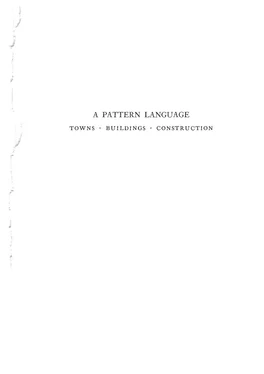Christopher alexander - A pattern language
Здесь есть возможность читать онлайн «Christopher alexander - A pattern language» весь текст электронной книги совершенно бесплатно (целиком полную версию без сокращений). В некоторых случаях можно слушать аудио, скачать через торрент в формате fb2 и присутствует краткое содержание. Жанр: Прочая научная литература, на английском языке. Описание произведения, (предисловие) а так же отзывы посетителей доступны на портале библиотеки ЛибКат.
- Название:A pattern language
- Автор:
- Жанр:
- Год:неизвестен
- ISBN:нет данных
- Рейтинг книги:3 / 5. Голосов: 1
-
Избранное:Добавить в избранное
- Отзывы:
-
Ваша оценка:
- 60
- 1
- 2
- 3
- 4
- 5
A pattern language: краткое содержание, описание и аннотация
Предлагаем к чтению аннотацию, описание, краткое содержание или предисловие (зависит от того, что написал сам автор книги «A pattern language»). Если вы не нашли необходимую информацию о книге — напишите в комментариях, мы постараемся отыскать её.
A pattern language — читать онлайн бесплатно полную книгу (весь текст) целиком
Ниже представлен текст книги, разбитый по страницам. Система сохранения места последней прочитанной страницы, позволяет с удобством читать онлайн бесплатно книгу «A pattern language», без необходимости каждый раз заново искать на чём Вы остановились. Поставьте закладку, и сможете в любой момент перейти на страницу, на которой закончили чтение.
Интервал:
Закладка:
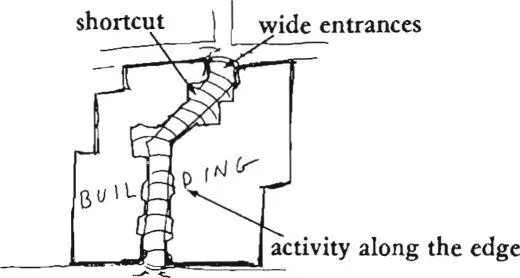
♦J* -b
Treat the thoroughfare as much like a pedestrian street (100) as possible, with open stairs (158) coming into it from upper storys. Place entrances, reception points, and seats to form the pockets of activity under the lower ceilings at the edges—
FAMILY OF ENTANCES (l02), ACTIVITY POCKETS (124), RECEPTION WELCOMES YOU ( I 49), WINDOW PLACE (l8o), CEILING
height variety (190), and give these places strong natural light—tapestry of light and dark (I 35). Make a connection to adjacent rooms with interior windows (194) and solid doors with glass (237). To give the building thoroughfare the proper sense of liveliness, calculate its overall size according to pedestrian DENSITY (123). . . .
| 102 FAMILY OF ENTRANCES* |
|---|
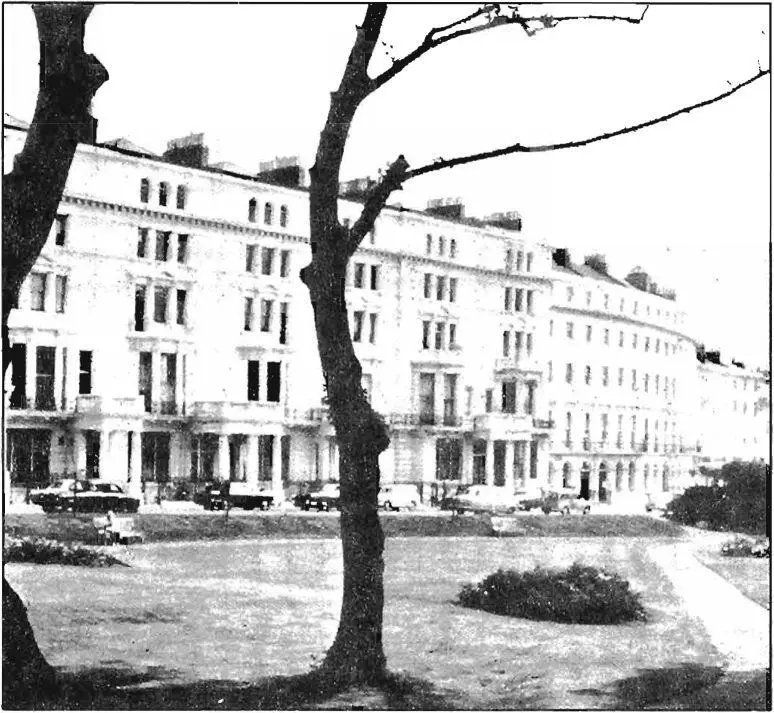 |
499
. . . this pattern is an embellishment of circulation realms (98). circulation realms portrayed a series of realms, in a large building or a building complex, with a major entrance or gateway into each realm and a collection of minor doorways, gates, and openings off each realm. This pattern applies to the relationship between these “minor” entrances.
When a person arrives in a complex of offices or services or workshops, or in a group of related houses, there is a good chance he will experience confusion unless the whole collection is laid out before him, so that he can see the entrance of the place where he is going.
In our work at the Center we have encountered and defined several versions of this pattern. To make the general problem clear, we shall go through these cases and then draw out the general rule.
I. In our multi-service center project we called this pattern Overview of Services. We found that people could find their way around and see exactly what the building had to offer, if the various services were laid out in a horseshoe, directly visible from the threshold of the building. See A Pattern Language Which Generates Multi-Service Centers , pp. 123—26.
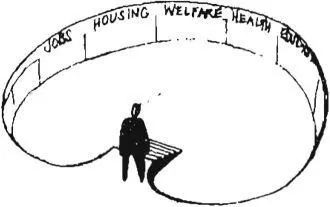
Overview of services.
2. Another version of the pattern, called Reception Nodes, was used for mental health clinics. In these cases we specified one
102 FAMILY OF ENTRANCES



dearly defined main entrance, with main reception clearly visible inside this main entrance and each “next” point of reception then visible from the previous one, so that a patient who might be frightened or confused could find his way about by asking receptionists—and could always be directed to the next, visible receptionist down the line.
Reception nodes.
3. In our project for re-building the Berkeley City Hall complex, we used another version of the pattern. Within the indoor streets, the entrance to each service was made in a similar way—each one bulged out slightly into the street, so that people could easily find their way around among the resulting family of entrances.
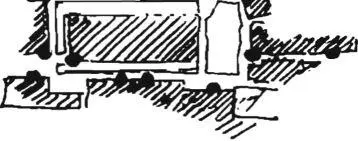 |
| Family of entrances. |
jmmm.
4. We have also applied the pattern to houses which are laid out to form a cluster. In one example the pattern drew different house entrances together to make a mutually visible collection of them, and again gave each of them a similar shape.
In all these cases, the same central problem exists. A person who is looking for one of several entrances, and doesn’t know his way around, needs to have some simple way of identifying the one entrance he wants. It can be identified as “the blue one,” “the one with the mimosa bush outside,” “the one with a big 18 on it,” or “the last one on the right, after you get round the
corner/’ but in every case the identification of “the one . . can only make sense if the entire collection of possible entrances can first be r en and understood as a collection. Then it is possible to pick one particular entrance out, without conscious effort.
Therefore:
Lay out the entrances to form a family. This means:
1. They form a group, are visible together, and each is visible from all the others.
2. They are all broadly similar, for instance all porches, or all gates in a wall, or all marked by a similar kind of doorway.
family ofentrances
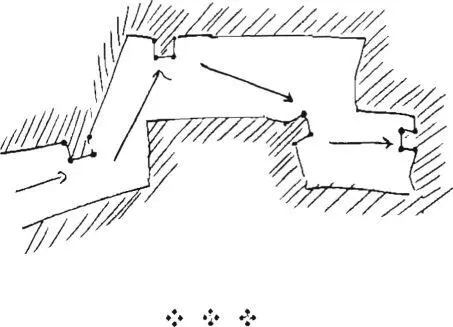
In detail, make the entrances bold and easy to see— main entrance (iio);when they lead into private domains, houses and the like, make a transition in between the public street and the inside— entrance transition(112); and shape the entrance itself as a room, which straddles the wall, and is thus both inside and outside as a projecting volume, covered and protected from the rain and sun— entrance room(130). If it is an entrance from an indoor street into a public office, make reception part of the entrance room— reception welcomes you(149). . . .
| 103 SMALL PARKING LOTS* |
|---|
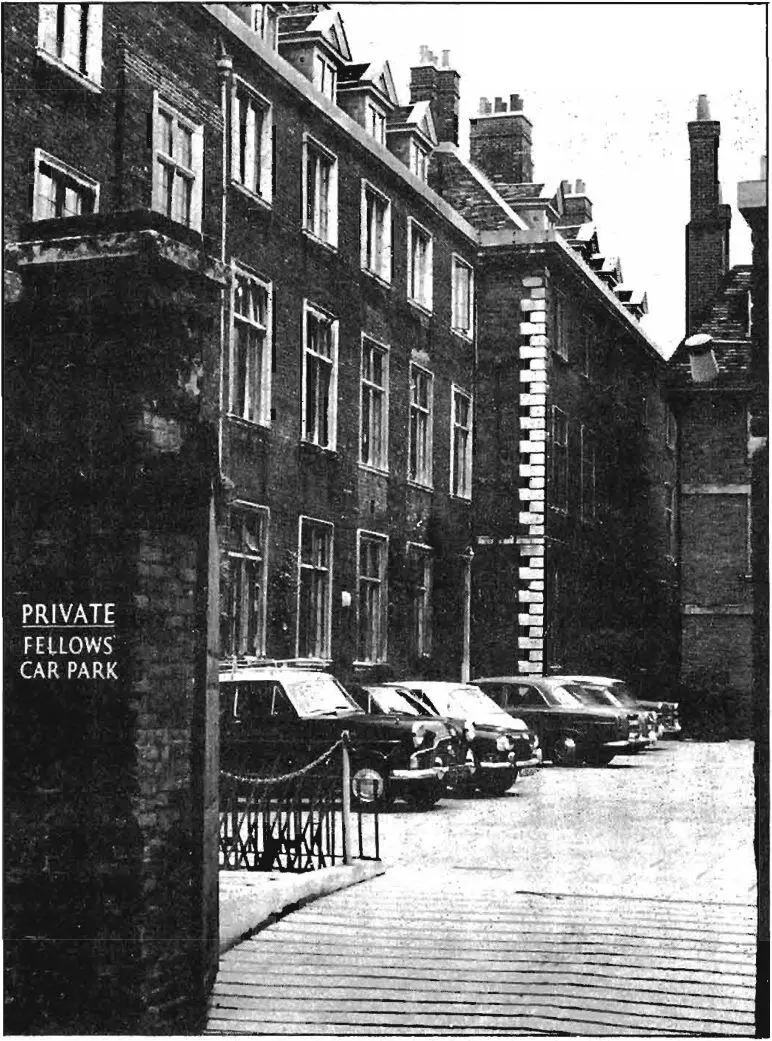 |
503
. . . since a small parking lot is a kind of gateway—the place where you leave your car, and enter a pedestrian realm—this pattern helps to complete shopping streets (32), house
CLUSTER(37), WORK COMMUNITY(41), GREEN STREETS(51),
main gateways (53), circulation realms (98), and any other areas which need small and convenient amounts of parking. But above all, if it is used correctly, this pattern, together with shielded parking (97), will help to generate nine per cent parking (22) gradually, by increments.
v * *
Vast parking lots wreck the land for people.
In nine per cent parking (22), we have suggested that the fabric of society is threatened by the mere existence of cars, if areas for parked cars take up more than 9 or 10 per cent of the land in a community.
We now face a second problem. Even when parked cars occupy less than 9 per cent of the land, they can still be distributed in two entirely different ways. They can be concentrated in a few huge parking lots; or they can be scattered in many tiny parking lots. The tiny parking lots are far better for the environment than the large ones, even when their total areas are the same.
Large parking lots have a way of taking over the landscape, creating unpleasant places, and having a depressing effect on the
Читать дальшеИнтервал:
Закладка:
Похожие книги на «A pattern language»
Представляем Вашему вниманию похожие книги на «A pattern language» списком для выбора. Мы отобрали схожую по названию и смыслу литературу в надежде предоставить читателям больше вариантов отыскать новые, интересные, ещё непрочитанные произведения.
Обсуждение, отзывы о книге «A pattern language» и просто собственные мнения читателей. Оставьте ваши комментарии, напишите, что Вы думаете о произведении, его смысле или главных героях. Укажите что конкретно понравилось, а что нет, и почему Вы так считаете.
